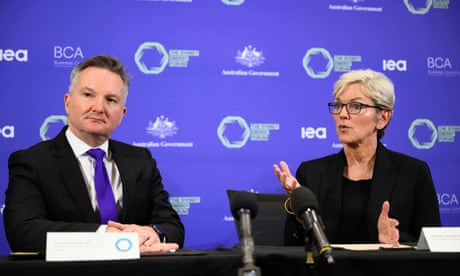- by foxnews
- 03 Apr 2025
Breaking from China’s clean energy dominance ‘imperative’, US and Australia say after new climate tech deal
Breaking from China’s clean energy dominance ‘imperative’, US and Australia say after new climate tech deal
- by theguardian
- 13 Jul 2022
- in news

The US and Australia have stressed the importance of breaking the near-complete reliance on China for zero emissions technology supplies while signing a new agreement that promises to accelerate the development of climate solutions.
In a joint press conference in Sydney, the US energy secretary, Jennifer Granholm, and the Australian climate change and energy minister, Chris Bowen, announced a "net zero technology acceleration partnership", including an initial focus on long-duration energy storage and digitising power grids.
They said the agreement was motivated in part by the need for a clean energy and critical mineral supply chain that did not depend as much on China, which is responsible for about 80% of solar energy technology manufacturing. According to the International Energy Agency (IEA), it is expected to reach 95% by 2025.
Granholm compared the risk of relying on China for clean technology to the west's over-dependence on Russian fossil fuels - a mistake that sparked a global energy crisis after it invaded Ukraine.
"I worry that China has big-footed a lot of the technology and supply chains that could make us vulnerable if we don't develop our own supply chains," she said. "From an energy security point of view, it is imperative that nations that share the same values develop our own supply chains, not just for the climate, but for our energy security.
"We've seen what happens when we rely too much on one entity for our source of fuel, and we don't want that to happen - so to diversify those energy sources and to link up with partners is part of our energy security."
Bowen agreed. "It's good for our own economies and it's good for our national security to have supply chains among ourselves, but also amongst friends and allies," he said.
The Australian minister said the partnership would "work to ensure critical minerals supply chains are secure and resilient". That meant ramping up production, processing and manufacturing capacity, he said. "The partnership is a commitment to make climate change a centrepiece of our alliance with the US," he said.
Granholm said the switch to renewables could be "the greatest peace plan of all" as no country could be "held hostage" over its access to solar and wind resources. "They have not ever been weaponised, nor will they be," she said.
The Australia-US partnership included few details, but said the countries would also focus on supporting the integration of variable renewable energy and the development of hydrogen and carbon dioxide removal, including direct air capture technology.
It was revealed on the sidelines of the Sydney Energy Forum, co-hosted by the Australian government and the IEA. A common theme among speakers at the forum was the importance of focusing on renewable energy to address the crisis caused by Russia's attack on Ukraine.
The IEA's executive director, Fatih Birol, said the world was in the middle of "the first global energy crisis" due to its over-reliance on Russian oil, gas and coal. He said it might get worse as the northern hemisphere entered winter, but expressed hope it could lead to governments accelerating the shift towards renewable energy.
Birol said about 40% of energy policies across the globe were introduced as a response to the oil crisis of the 1970s. He was "very hopeful" that the move to clean energy would be accelerated in a similar way now.
He said solar power had grown dramatically across the globe because it was cheap, and that people who argued that renewable energy policy was in part to blame for the crisis were "absolutely wrong". "Factually and, in my view, ethically, this is very wrong and misleading," he said.
The forum was opened by Anthony Albanese arguing Australia had rejoined the ranks of "trusted global partner". The prime minister later told reporters it was time for Australia to "stop the nonsense", "wake up" and work across the political divide to end the climate wars.
Albanese said the latest round of catastrophic flooding made the case to get on with legislating a more ambitious policy. He said Labor would attempt to legislate its medium-term emissions target when parliament resumed, and if MPs or senators chose to vote against the legislation they would be "held accountable for it".
The prime minister said he was open to "sensible amendments" but not "game playing about figures plucked from the air", and reiterated that Labor intended to stick with its target of a 43% emissions cut by 2030 compared with 2005 that it had modelled last year.
The Greens and some independents have called for a higher target - ranging from 50% to 75% - based on advice from climate scientists.
- by foxnews
- descember 09, 2016
Flight passenger says man deliberately squatted in window seat, ignites social media debate
An airline flyer said a seat squatter tried to tell her to swap seats with him, but she stood her ground, prompting a social media debate. A travel expert weighs in.
read more


